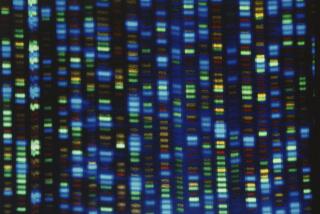Can you master your own epigenetics?
- Share via
Some authors say you can apply the new science of epigenetics to improve your life right now.
“Epigenetics is mastery — you have power over your biology,” says author and lecturer Bruce Lipton of Santa Cruz, a former medical school professor and author of “The Biology of Belief.” He says that changes in behavior are enough to reprogram your genes via chemicals that affect gene activity in the short term.
The placebo effect, Lipton says, is a prime example of taking control over biology. Believe a medicine will work and the brain turns up genes that make you feel better, he says. Conversely, he adds, negative feelings such as stress can shut off immunity genes and make a person more susceptible to disease.
“The mind is directly connected to the genetics,” he says.
Mark Sisson, an independent health researcher in Malibu, is another epigenetics-you-can-use proponent. Sisson, owner of a dietary supplement company called Primal Nutrition and the author of “The Primal Blueprint,” says the key to health is figuring out what turns on good genes and turns off bad ones.
Figure that out, he says, and genes you inherited that put you at higher risk of, say, cancer need not cause disease — you can shut them off.
Sisson says the key to making the right genes stay on — or off — is to mimic a primitive human lifestyle. Reasoning that meat was a large part of early man’s diet, he makes it part of his own. In fact, his primal blueprint diet says you can eat as much meat and saturated fat as you want, but carb-heavy grains should be avoided because humans have not evolved to digest them.
Both these authors use a broad definition of epigenetics: They mean it to include moment-to-moment changes in gene control as well as the more stable, longer-term changes more often considered epigenetics by the scientists who study it.
These authors may be moving ahead of the science, epigenetics researchers say.
It’s true that diet or medication might change patterns of gene activity, says Dana Dolinoy, a toxicologist at the University of Michigan School of Public Health in Ann Arbor. But, she notes, those changes could be good or bad, and it’s too soon to make broad recommendations on such a young science. She also notes that so far most epigenetics research has been conducted in mice.
“What’s good for a mouse may not be good for me,” Dolinoy says.
However, she adds, simple changes such as thinking positive are unlikely to be harmful.
health@latimes.com






